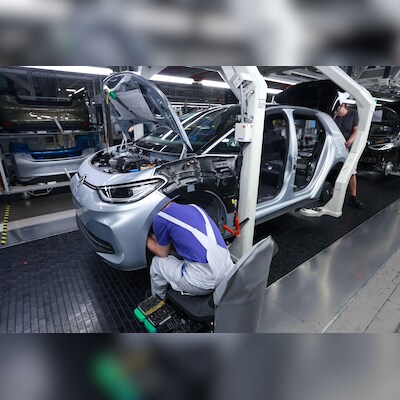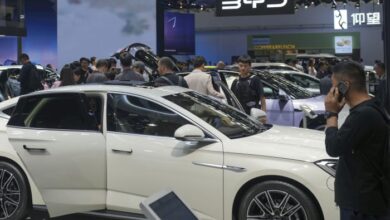China may raise temporary tariffs on some US, EU cars, warns lobby group | World News

Chinese EVs are under the spotlight in the EU and US, as China controls a majority of the battery supply chain and produces more EVs than anywhere else in the world
By Linda Lew
China could unleash tariffs as high as 25 per cent on imported cars with large engines, according to one lobby group, as trade tensions ramp up between the world’s No. 2 economy and the US and European Union.
Click here to follow our WhatsApp channel
The China Chamber of Commerce to the EU said it was informed about the potential move by “insiders,” in a statement posted on X. Such levies would affect European and US carmakers, and have a “significant” impact on Beijing’s relationship with Brussels, it added.
China is ramping up threats of retaliation as the first deadline looms for the European Commission’s probe into Beijing’s subsidies of its booming electric vehicle market. The EU must inform Chinese exporters whether it intends to impose tariffs by June 5. China last week also hinted it could impose tit-for-tat levies on European wine and dairy products.
The chamber referred to an interview published by the ruling Communist Party’s Global Times newspaper on Tuesday, in which Liu Bin, the chief expert at the China Automotive Technology & Research Center, called for temporarily increasing the tariff rate on imported cars with engines larger than 2.5 liters.
World Trade Organization rules would allow setting a tariff on imported vehicles up to 25 per cent, the report cited Liu as saying, adding that China imported 250,000 cars with engines larger than 2.5 liters in 2023, accounting for about 32 per cent of all imported vehicles.
The carmakers most impacted by the potential tariff would be Toyota Motor Corp., Mercedes-Benz Group AG and BMW AG, said Daniel Kollar, head of consultancy Intralink’s automotive and mobility practice.
Japanese cars such as Toyota’s Lexus brand would only be affected if China imposed tariffs on imports from all nations, instead of targeting shipments from the US or EU.
“China’s retaliatory trade investigations and warnings are not deterring the EU,” Eurasia Group analysts wrote in a note on Tuesday. “Brussels is eager to send a strong signal to Beijing with its EV probe that the EU will counteract Chinese subsidies and overcapacity.”
The Biden administration earlier this month announced 100 per cent tariffs on Chinese electric cars, while the EU is investigating Beijing’s subsidies across a range of industries, which has prompted Chinese firms to pull out of rail and energy tenders.
Chinese EVs are under the spotlight in the EU and US, as the Asian nation controls a majority of the battery supply chain and produces more EVs than anywhere else in the world. With a price war and slowing economy at home, Chinese automakers are expanding overseas, sparking allegations the country is exporting excess auto capacity and cybersecurity concerns over the tech-laden vehicles.
President Xi Jinping visited Europe earlier this month seeking to dissuade the bloc from going down the same path as the US, which has unveiled a sweeping set of charges on some imports from China — raising concerns in Beijing that American allies may follow suit.
“Certain countries and regions have taken restrictive measures in the new-energy vehicle sector, which run counter to the green development concept,” Liu said, in the Global Times interview. “Such measures will only hurt the interests of their own consumers.”



